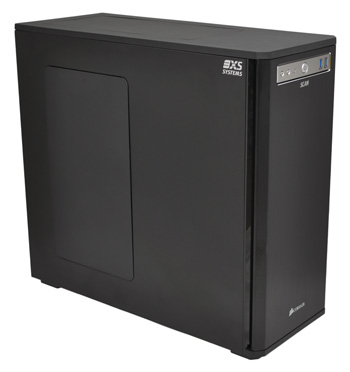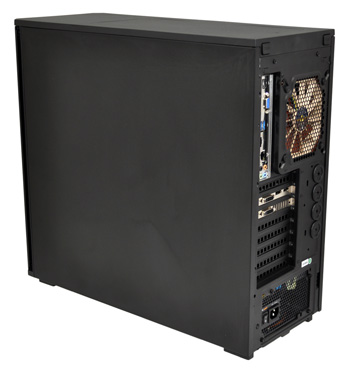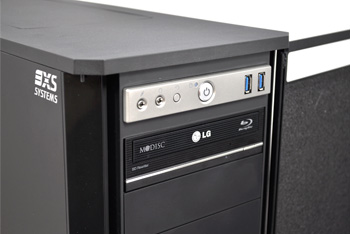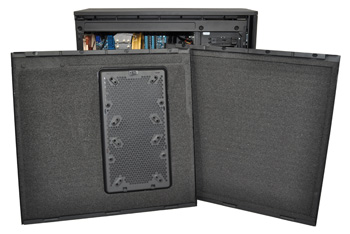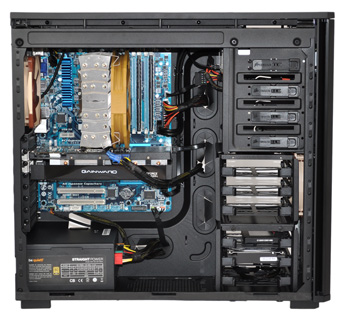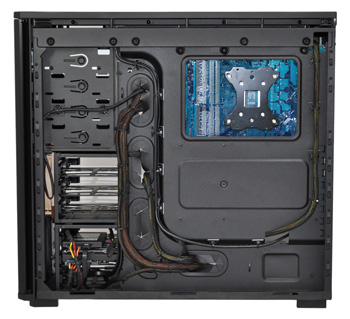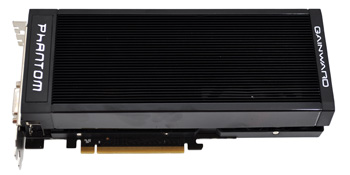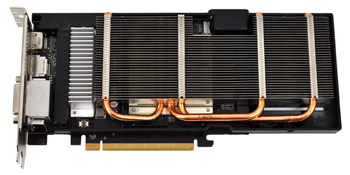Introduction
Scan Computers has introduced a grand selection of high-end PCs in recent months, and each variant has typically offered an attractive set of common features; extreme performance, overclocked components, impressive thermal performance and first-rate customer service.
There are clearly plenty of reasons to consider the 3XS package, but while the systems can be mind-bogglingly powerful - the 3XS Carbon SLI being a prime example - other important factors such as power consumption and noise pollution are at times overlooked.
In a recent review we stated that we'd like to see Scan put its PC-building know-how into a gaming rig that's quieter and more refined, and the company appears to have taken those comments to heart. To celebrate the launch of NVIDIA's latest graphics powerhouse - the GeForce GTX 660 Ti - Scan isn't introducing a multi-GPU monstrosity; no sir, it's launching a £1,299 PC that promises to be both ultra-fast and whisper-quiet.
It's dubbed the 3XS Z77 Performance Q10 (the Q, we presume, stands for Quiet), and for all intents and purposes, it's essentially the existing 3XS Z77 Performance GTX tweaked and updated in an effort to drastically reduce noise.
Fast and quiet is exactly the way we like our PCs to be, so it's interesting to see how Scan has approached this particular project. The company's engineers have a vast selection of components to choose from, and the 3XS Z77 Performance Q10 represents their pick of the best hardware for a high-performance rig that keeps quiet in use.
So, what have we got? First and foremost, the noisy Corsair Carbide Series 300R that featured in the original GTX system has been replaced in the Q10 with a tidy, quiet and well-rounded Corsair Obsidian Series 550D.
The chassis plays an integral part in minimising system noise, and Scan's playing it safe; the Obsidian Series 550D is a proven performer and uses thick sound-deadening material on both side panels, as well as the front door and the side and top vents.
One potential stumbling block for system integrators is the 550D's matte-black finish - it looks suitably smart, but it's prone to scuff marks and like many chassis in the Obsidian Series range, it can look worse for wear after being built into. Fortunately, Scan appears to be aware of this particular challenge and is ensuring that the 550D is shipped to look as new - our review sample arrived unblemished and well-secured.
But when you're attempting to make a truly quiet PC, the chassis is just the tip of the iceberg. It's on the inside that a lot of care and attention is needed, and Scan's challenge is to reduce noise levels without sacrificing too much in terms of performance.
The system's foundation - a Gigabyte GA-Z77X-D3H motherboard, 8GB of Corsair Vengeance LP memory and an Intel Core i5-3570K processor - is standard fare for an Ivy Bridge machine, but Scan has made the decision to limit the factory overclock. Whereas the Z77 Performance GTX ships with the Core i5 chip running at 4.6GHz, the Z77 Performance Q10 brings it down a notch, to 4.4GHz - a number that's easier to cool quietly.
Speaking of cooling, Scan has a Thermalright Archon on CPU duty with a single ultra-low-noise 140mm fan, and Corsair's default chassis fans have been swapped out, too, in favour of a pair of quieter 120mm Noctua NF-F12s (both of which are set to Silent mode in the Gigabyte BIOS).
It's the graphics card that tends to raise the decibel count, however, so Scan's hoping to side-step any such issues by including a 2GB Gainward GeForce GTX 660 Ti Phantom as standard. We know that NVIDIA's latest offers excellent 1080p performance, and Gainward's factory overclocked speeds of 1,006MHz on core and 6,108MHz on memory will help get the most out of the GPU.
Of course, performance isn't the only consideration; the graphics card needs to run quiet, too, so we'll find out how the triple-slot, three-heatpipe and dual-fan cooler performs a little later in the review.
The fact that there are fans inside the PC - and plenty of them - will prevent the Q10 from being truly silent, but Scan's choice of components should lower noise considerably. The primary storage device is a no-noise 120GB Corsair Force Series 3 SSD, and extra capacity is provided by a 2TB Seagate Barracuda Green that's purposely chosen for its reduced operating speed of 5,900RPM and consequently lower noise.
Even the LG Blu-ray writer can be quiet - it spins at 1x during movie playback - and Scan's power supply of choice is a near-silent, semi-modular be quiet! Straight Power E9 CM rated at 480W. A good choice, but it's interesting to note that Scan hasn't opted for a power supply whose fan turns off completely at low load.
Scan's engineers haven't gone to any real extremes - mechanical hard drives haven't been relegated and oversized passive coolers aren't an option - but the aim here is to offer the performance you'd come to expect from a 3XS machine in a noticeably quieter package. Of course, the usual 3XS benefits are also present; these include delivery from an in-house driver as opposed to a national courier, optional at-your-desk installation, and a standard three-year warranty that provides on-site support for the first 12 months.
The 3XS Z77 Performance Q10 is shaping up rather nicely, but it'll need to be very fast and extremely quiet if it's going to warrant the £1,299 asking price. It hasn't escaped our attention that the existing 3XS Z77 Performance GTX offers a higher-clocked Core i5-3570K processor and a quicker GeForce GTX 670 for £150 less, so Scan's proposition is tricky; are consumers going to be willing to spend extra and sacrifice performance in an effort to reduce noise?






